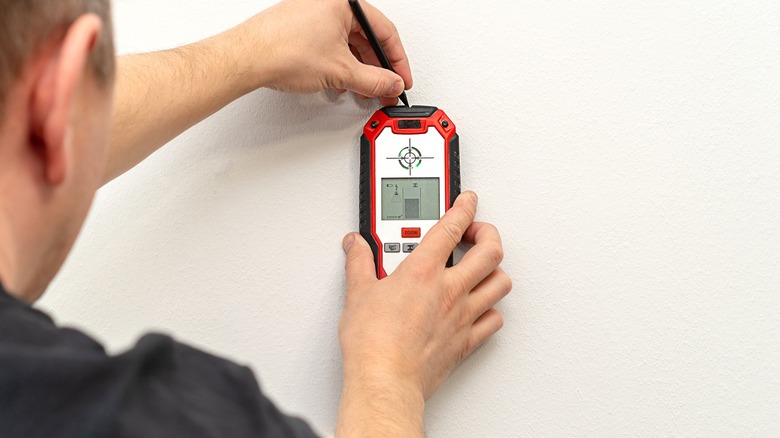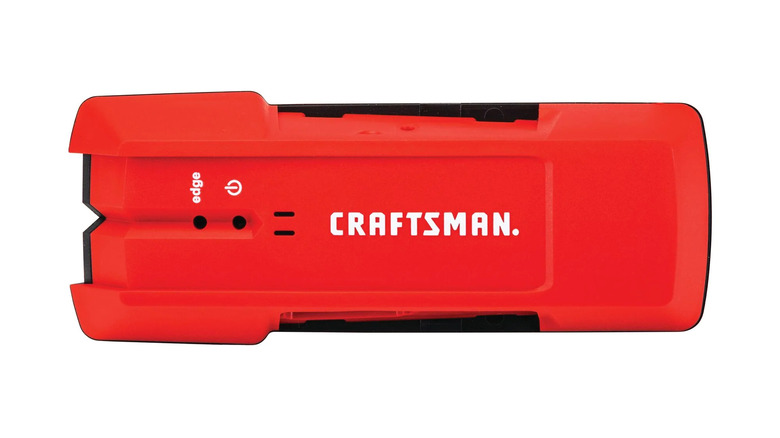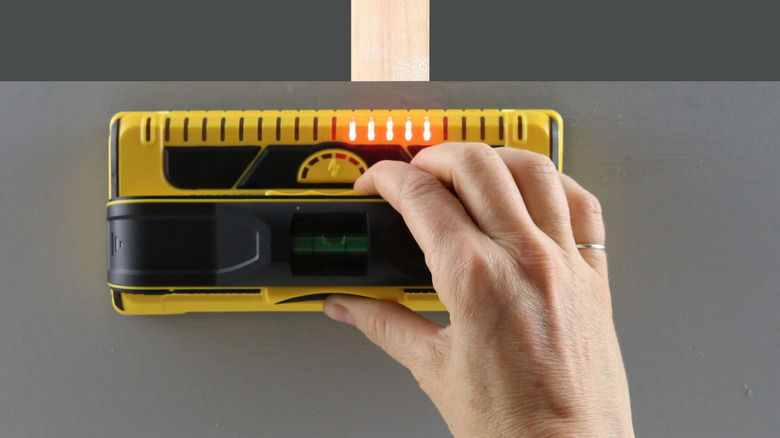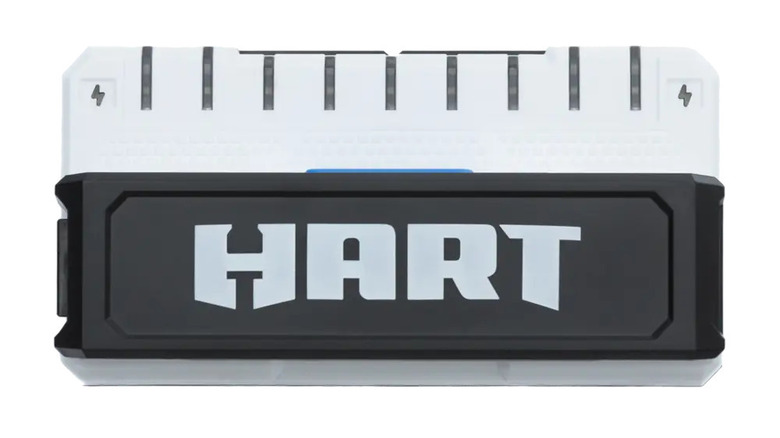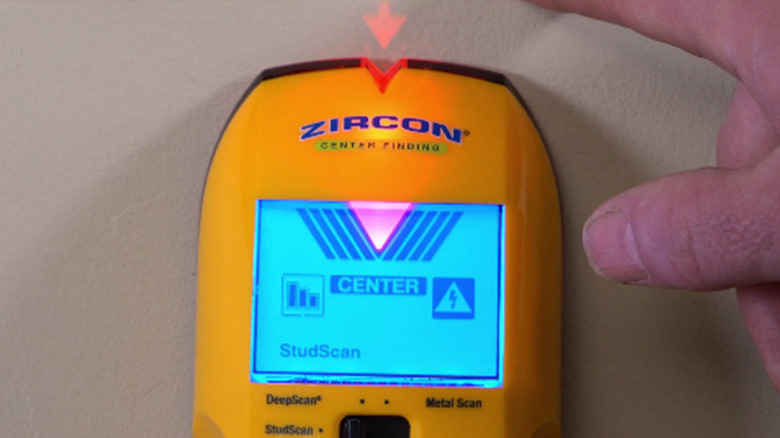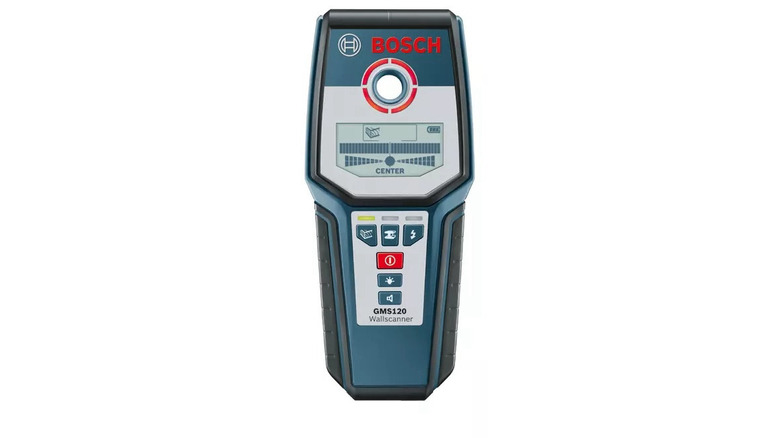5 Of The Best Stud Finders For Any Job
We may receive a commission on purchases made from links.
Stud finders are one of the most important tools anyone can have in their toolbox. Although they may not be obvious assets like a hammer, a screwdriver, or a wrench, having a stud finder in your arsenal ends up being such a useful tool for a litany of reasons when working with your walls. When you are hanging pictures, installing shelves, or doing anything that requires you to drill holes in your wall (and you aren't trustworthy of stud finder apps), it's almost impossible to do this without a stud finder, unless you want to risk not securing what you are putting into your wall or damage wires running through them.
Not all stud finders are created equal, however. Some just do what the name implies with somewhat decent accuracy, and others can tell you what is exactly behind that drywall at all points. Depending on your budget and where you need drilling done, there are many different options for stud finders to best suit your needs. These stud finders should give you a wide range of options to choose from when selecting the stud finder that needs to be in your toolbox.
Craftsman 3/4-Inch Depth Stud Finder
If all you want out of a stud finder is for it to simply find studs, there are a ton of devices that will do just that. However, if you want one that comes highly rated at a very good price, a good place to look is Craftsman. They have several different stud finders available, but the one for your most basic needs is the 3/4-Inch Depth Stud Finder. This tool is designed to find the edges of wood and metal studs as you glide it along the wall.
This thing is incredibly light at just a little over three ounces, and in testing done by Popular Mechanics, it was consistently reliable in finding studs. This is the stud finder I have in my toolbox, and it has yet to let me down whenever I've needed to put up a TV wall mount or hang a photograph. You will find this retailed at various stores from $11-12, so it is certainly not going to be breaking the bank. If all you need is a basic, no-frills stud finder, this is the one to get.
Franklin Sensors ProSensor M210
While an effective tool, the scanning area of the Craftsman stud finder is quite narrow. Sometimes you may find yourself running the tool along your wall for a good period before you actually find one. However, there are other stud finders out there that considerably widen out how much of the wall gets scanned as you use it. For instance, there is the Franklin Sensors ProSensor M210. This stud finder features 13 sensors in its body and has a line of 21 LED lights along its edge to show you exactly where the stud is in the wall once it has been detected.
Finding the edge of the stud, which the Craftsman can do, is one thing, but the ProSensor M210 will be able to show you the width of the full stud through its LED indicators, making sure that you aren't missing anything when you decide to start drilling. Below the main indicators is also a detector that shows you if you have landed on a live electrical wire in your scanning. Built into the stud finder is a level, which eliminates having to use multiple tools at once when attaching things to the wall. The ProSensor M210 retails for a quite bit more at $62.99, but considering the extra features and the extra width, that is a fair hike in price.
Hart Professional Stud Finder
If the Franklin Sensors ProSensor M210 sounds appealing to you but the price tag is a little too hefty, then a more than worthy alternative comes from Hart Tools, which can be found at Walmart. Hart makes a Professional Stud Finder that is the same concept as the one from Franklin Sensors, but instead of 13 sensors for detection, it has nine, which is still quite a lot. It can detect studs up to 1.5 inches behind your wall, which is just a tad shorter than the M210's 1.7 inches, but that is still more than the 3/4 inch detection of the Craftsman.
The Hart Professional Stud Finder also indicates that a live electrical wire has been detected, but it lacks the same precision of displaying exactly where that wire is as the M210. Retailing for just under $28, Hart has made a good budget alternative to the more expensive M210. So, what it lacks in complete precision it more than makes up for in its pricing.
Zircon A200
While the LED indicators that run along the tops of the Franklin Sensors and Hart stud finders do give you a great idea about where and how big your studs are, maybe you want a stud finder that tells you exactly where you are on the stud without having to hold a rather wide device. This is where the Zircon A200 comes into play. This stud finder comes highly rated by users, and the clear differentiator between this stud finder and the previous ones mentioned is the LCD screen on the device that tells you exactly where you are on the stud. Not only that, but it will project a laser indicator from the top of the device in the shape of an arrow so you know exactly where to make your mark for drilling in the center of the stud.
Like the previous stud finders, the Zircon A200 also detects things like metal and live electrical wiring, which are shown to you on the LCD, but its best asset is placing you directly in the center of the stud, which in the end is the most important part of stud finding. In terms of pricing, it's a pretty good deal, as it's currently available for $52.99 on Amazon, about $10 less than the Franklin Sensors ProSensor M210.
Bosch GMS120
All of the previously mentioned stud finders provide ample bang for your buck with how they can detect studs, but if you really want to pay top dollar for a product that combines the features of all of these devices, then the stud finder you should pick up is the Bosch GMS120. This device is commonly known as the best stud finder, period.
The Bosch GMS120 has an LCD screen for precision center detection and the ability to detect metal and live electrical wiring, but it does even more. It can also detect plastic plumbing pipes and rebar in concrete. For extra assistance in detection, it also can indicate how close you are to a stud through audio signals. The GMS120 being able to do so much is why it retails for $99.99, though you can get it for $79 on Amazon. This stud finder may be a little too much for most people's needs, but if you are someone dealing with a lot of thick, complicated material in your walls, this is your best bet.
